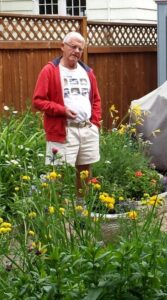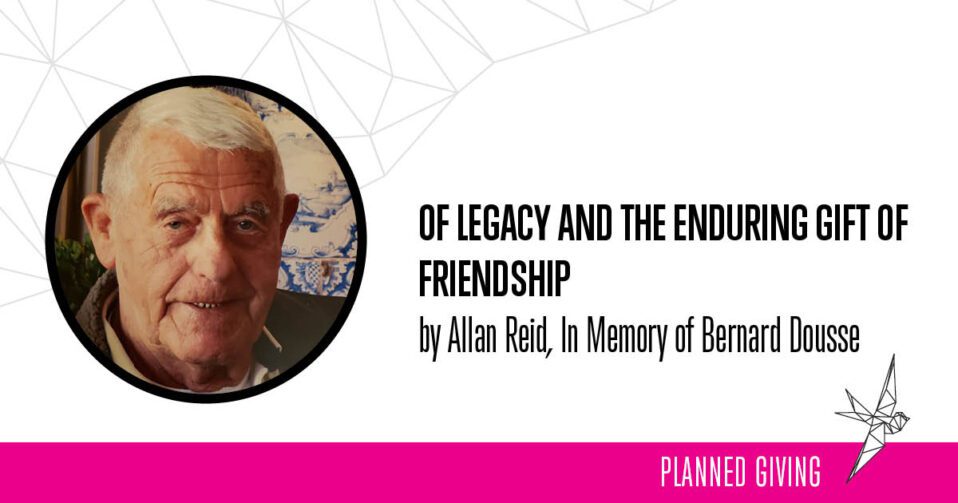One of life’s greatest treasures is the friendships that develop when paths cross. How fortunate is the person who can draw from a trove of rich and valued memories to rightly express the essence of a life lived by the values, hopes, and aspirations that were most important to them. YESS warmly thanks Allan Reid for sharing an eloquent and personal reflection on the life of Bernard Dousse: a good and close friend to many and a friend to YESS.
It was with deep sorrow, and some surprise, that we mourn Bernard Dousse: a long serving pillar of the Edmonton LGBTQ+ community. Bernard was a man who embraced community in all its iterations. Born in Fribourg, Switzerland, Bernard was the youngest of 13 siblings. The prodigal child of his family, he was the only sibling to seek a life far from the constraints of familiarity, from oversight, and the fear of scandal.
Bernard was born October 1, 1931, into a devoutly Catholic family. Several of his siblings would later become priests or nuns—some so much older than he, as to be, effectively, adults whom young Bernard would have been obliged to hear and obey. He did not speak much about the conditions of his growing up, at least not to me. But there were annual trips back to Fribourg, of which he often expressed his joy in reconnecting with his family, his place of birth, and welcoming new generations of nieces and nephews. Did they know about his homosexuality? Bernard claimed, when asked, that they did not. Keeping such a secret is much more difficult to imagine today than it was then. But a secret can cut both ways. Perhaps there was a silent understanding among his siblings: that thing left unspoken that then can be ignored.

Bernard Dousse: A gracious host, we all share memories of fine weather spent out in his lush vegetable and flower garden, which he lovingly tended | Photo courtesy of Blaine Madsen
Honestly, I never met anyone from Bernard’s family, nor anyone who claims to have done so. I do not know his family dynamics. What we do know is that Bernard launched his career with a doctorate in Natural Science from the Faculty of Sciences at the University of Fribourg (1965). Post doctorate, he entered the field of geology, working first in Nigeria, then spending time in South Africa, and eventually arriving in Canada, first on Prince Edward Island, then Montréal and finally, to Alberta where he took a position with the Alberta government, retiring at the prescribed age of 65 in 1996. He was then head of the Evaluation Section, Hydrology Branch, for Alberta Environmental Protection. His was a life-long career path that gave Bernard the freedom to be who he really was, and there was no better life than that.
I first met Bernard in Edmonton in 1987 or 1988. He was an older gay man, and I was in my early twenties and still learning the ropes of gay society. Older gay men were routinely dismissed as trolls among my age group—an odious term suggesting that the only thing they wanted was a young toy to discard after our novelty had worn off. Bernard was not that man. To him, I and everyone else my age were the future, and we deserved to have a brilliant one.
But this was also the death-sentence time in the HIV/AIDS pandemic, before the cocktails of drugs that would eventually bring the disease under control, when we were all struggling to understand how the disease was spread and how to protect ourselves. The very same were asked during the recent COVID-19 pandemic amid constantly changing recommendations from health authorities. Just as someone’s allergies aroused such fear of their COVID status that people would take a wide path around the poor person suffering seasonal sniffles and sneezes, so then, in many minds, a gay man was automatically deemed to be infected and contagious. And all too often, queer youth had only our queer elders to turn to for knowledge, support, solace, and comfort. Bernard was such a man.
From its inception, Bernard became active within the AIDS Network of Edmonton, and on a more casual level, served as support for many people, younger and older, who were living with HIV/AIDS. An ear that was listening. Someone to hear one’s fears, a mentor for every young man trying to figure out how to live and love in a world dominated by the virus and its associated discrimination.
Bernard accepted everybody—straight, gay, lesbian, transgender, and, as the concept developed, our non-binary and gender-fluid friends as well. My husband and I moved away from Edmonton in the late 1990s, so though we remained friends, I do not know what relations Bernard had with today’s youth, but I do know that he would have offered an understanding ear. He would have been uplifting, supportive, and a font of knowledge and experience. To Bernard, there was never a question: we are all equals entitled to our own brilliant futures.
And so, in early 2021, at the time when he was still a model of health and fitness, and with a sharp mind such that we, his friends, could all envision him living another decade or more, but, nevertheless, quickly approaching 90 years of age, he revisited his will, as we all must do with increasing regularity the older we get. Bernard approached YESS as a potential recipient from his estate. He was interested in the services and supports that YESS provides to the youth of Edmonton, and of course, how dedicated in terms of their financial structures that YESS is to their stated commitments. He wrote: “I find the objectives and activities of YESS super-important for the well-being—present and future—of our youth-in-need, and certainly very worthy of my serious attention.”
Bernard was never in it for the ego. I am sure he thought of himself as a good person, but never better than anyone else. He did not want renown. What he wanted, through his legacy, was to continue to support Edmonton youth, straight, gay, lesbian, trans, non-binary—all youth—as they each forge their own paths toward a socially, mentally, and emotionally healthful future. And thus, his generous donation to Edmonton’s Youth Empowerment and Support Services.
To learn more about making a legacy gift, please contact Eileen Papulkas by phone at 780.468.7070 x298 or by email at eileen.papulkas@yess.org

